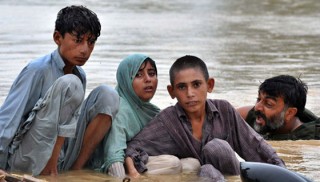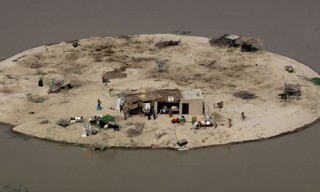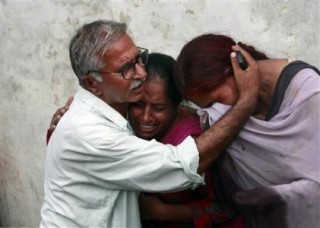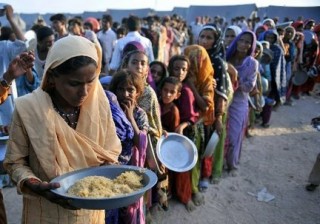“Climate change with all its severity and unpredictability has become a reality for 170 million Pakistanis”
By Dr. Ashraf Ezzat

Standing on the corner of the third world…years go by and the third world hardly changes, years go by and the third world hardly develops…years go by and the third world is caught up in a vicious circle of despair . The people of the third world dream of a dawn to a better future.
They dream of freedom, democracy and equality. They yearn for the prosperity they were promised by government after another and for which they have paid a heavy price.
But Poverty is all they know and poverty is all they know they want to live without.
And when the catastrophic floods hit Pakistan only the poor drowned. The flooding spared the Mullahs, the elites and the politicians. And this came as no surprise, for only the poor drown in Pakistan.
But seeing is believing the flooding of Pakistan, like horrid dreams, may seem wholly unbelievable to some spectators.
The worst floods in decades, which began nearly a month ago with hammering rains in the country’s northwest, have affected more than 17 million people, a UN official said.
Now, the waters are spreading through the rice-growing belt in southern provinces district by district, breaking through or flowing over embankments one by one.
“The floods are outrunning our relief efforts. We move faster and faster, but the finish line keeps moving further ahead,” United Nations spokesman Maurizio Giuliano said.
As more areas in the south succumb to the flooding, the International Committee of the Red Cross (ICRC)and the Pakistan Red Crescent have increased the geographical scope of their food distributions, and continue to restore water supplies and provide health care in the north-western areas where floodwaters are slowly receding and a health disaster is silently awaiting.
Pakistan Floods and climate change
According to UN officials estimates, the floods in Pakistan have so far left about 1,600 people dead and affected another 16.8 million.

Pakistan is awash with the worst flooding in more than a century; Russia fights wildfires stemming from unprecedented high temperatures; China faces mudslides of an intensity unseen in decades. For many scientists and political leaders, the confluence of these weather catastrophes amounts to tragic evidence that climate change is not just a future concern but a present danger that is liable to affect any country on earth.
“Climate change with all its severity and unpredictability has become a reality for 170 million Pakistanis” Shah Mehmood Qureshi, Pakistan’s foreign minister, told the United Nations General Assembly on Thursday “The present situation in Pakistan reconfirms our extreme vulnerability to the adverse impacts of climate change.” Qureshi added.
Floods of all sorts
Since its creation more than 50 years ago, Pakistan has been trapped in a flood like crisis of identity. For the ruling elite, it has meant the continuation of the feudal traditions and privileges. For the Muslim masses, it has been an unending series of disappointments, each day bringing more misery and suffering.

Pakistan’s plight is not unique. It is repeated almost everywhere in the Muslim world. The post-colonial ruling elites have one thing in common: they only look after their own interests; their record has been a roaring failure.
Pakistan’s dilemma is its inability to reconcile two irreconcilable trends: the secularism of the ruling elite and Islam of the masses. A goal that has considerably been successful in countries like Turkey and Lebanon. Since the elite have monopolized all power, resources and decision-making, the failure in Pakistan must be placed squarely in their corner.
When government fails to work people make their own personal governments. 170 million mini-governments is a recipe for disaster; it could be the golden opportunity for an extremist congregation of ambitious Mullahs to take over and sway people’s hearts to the side of Taliban, a fate that could prove more hazardous than the floods.
Pakistan is a country afflicted with back-to-back political and civil strife, war, terrorism, poverty and natural disaster. But with the monsoon floods, they are experiencing the worst natural calamity of its history. Even with the water considerably receding in the north, doctors are struggling to cope with the spread of water-borne diseases such as diarrhoea and cholera.
One look at the poor huddled masses of Pakistani flood victims and one get to realize that it is time to let go of our misconceptions about each other, it is time to let go of our fear of each other. It is time to reach out to each other.
Indifference is easy, hate is easy, apathy is easy, but for the sake of humanity, we should try to change as possible as we can the outcome of Pakistan worst humanitarian crisis by honestly addressing the everlasting good within us.
Gandhi once said “To a man with an empty stomach food is God”…and if I may, I would like to add compassion and sympathy to the served meal.

“Hungry men will close their minds
Ideas are not their food
Notions fall on stony ground
Where passions are subdued
Colour all the madness for the madness is the thorn that’s in our side
Standing on the corner of the third world”
from standing on the border of the third world by Tears for Fears.
Support Pakistan relief and development. Contact the ICRC or the Red Cross in your country.

Ashraf Ezzat is an Egyptian born in Cairo and based in Alexandria. He graduated from the faculty of Medicine at Alexandria University.
Keen not to be entirely consumed by the medical profession, Dr. Ezzat invests a lot of his time in research and writing. History of the ancient Near East and of Ancient Egypt has long been an area of special interest to him.
In his writings, he approaches ancient history not as some tales from the remote times but as a causative factor in our existing life; and to him, it’s as relevant and vibrant as the current moment.
In his research and writings, Dr. Ezzat is always on a quest trying to find out why the ancient wisdom had been obstructed and ancient spirituality diminished whereas the Judeo-Christian teachings and faith took hold and prospered.
Dr. Ezzat has written extensively in Arabic tackling many issues and topics in the field of Egyptology and comparative religion. He is the author of Egypt knew no Pharaohs nor Israelites.
He writes regularly at many well-known online websites such as Dissident Voice and What Really Happened.
Dr. Ezzat is also an independent filmmaker. His debut film was back in 2011 The Annals of Egypt Revolution and in 2012 he made Tale of Osiris a short animation for children.
In 2013 his short The Pyramids: story of creation was screened at many international film festivals in Europe. And he is working now on his first documentary “Egypt knew no Pharaohs nor Israelites”.
ATTENTION READERS
We See The World From All Sides and Want YOU To Be Fully InformedIn fact, intentional disinformation is a disgraceful scourge in media today. So to assuage any possible errant incorrect information posted herein, we strongly encourage you to seek corroboration from other non-VT sources before forming an educated opinion.
About VT - Policies & Disclosures - Comment Policy



